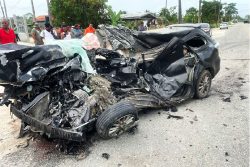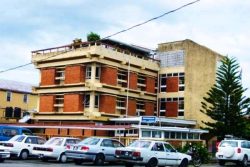AMMAN, (Reuters) – Syrians began the Muslim Ramadan fast in sombre mood today after troops stormed into Hama, scene of a 1982 massacre, in one of the bloodiest days of a five-month-old uprising against President Bashar al-Assad.
Rights activists said 80 civilians were killed in yesterday’s tank-backed assault on the central Syrian city where Assad’s father crushed an armed Muslim Brotherhood revolt 29 years ago by razing neighbourhoods and killing many thousands of people.
Security forces had besieged the Sunni Muslim city of 700,000 for nearly a month before Sunday’s crackdown on the eve of Ramadan, a holy month when Muslims fast in daylight hours.
Many flock to mosque prayers at night, occasions which may provide opportunities for protests to multiply across Syria.
The Syrian state news agency said the military entered Hama to purge armed groups that were terrorising citizens, an account dismissed as “nonsense” by a U.S. diplomat in Damascus.
The agency said eight police personnel were killed while “confronting armed terrorist groups” in Hama.
U.S. President Barack Obama said he was appalled by the Syrian government’s “horrifying” violence against its people in Hama and promised to work with others to isolate Assad.
“Syria will be a better place when a democratic transition goes forward,” Obama said in a statement.
Britain and France condemned the Hama assault. Italy urged a tough statement by the U.N. Security Council, where Russia and China have previously opposed any condemnation of Syria.
Germany requested that the Security Council meet today, a spokesman for its U.N. mission said. He said Germany had asked India, which holds the Council presidency for August, to schedule closed-door consultations and these were likely to take place in the afternoon, New York time.
The European Union plans to extend sanctions today by slapping asset freezes and travel bans on five more Syrians. EU sanctions already target Assad and at least two dozen officials, as well as Syrian firms linked to the military.
Turkey, one of Assad’s main allies until the uprising, said it and the rest of the Muslim world were “deeply disappointed” by the violence that belied Assad’s earlier reform pledges.
The Syrian human rights organisation Sawasiah said the civilian death toll in Hama had risen to 80. The independent group cited medical officials and witnesses in its report.
Syrian authorities have expelled most independent journalists since the anti-Assad unrest began in March, making it difficult to verify reports of violence and casualties.
Assad has increasingly relied on security services and army units dominated by members of his minority Alawite sect, which has dominated power since a 1963 Baath Party coup, to suppress protests in Syria, where most people are Sunni Muslims.
In a letter to troops on the occasion of army day, Assad repeated earlier statements that Syria was facing a foreign conspiracy to sow sectarian strife, adding that its aim was to “tear Syria into small statelets that compete to satisfy those who worked to slice them up.”.
“All of Syria’s honourable people are sure that we will emerge stronger from the crisis,” Assad said.








